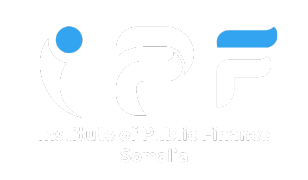IPF centers
Center for Performance Evaluation of Tax Expenditure in Somalia
This profile introduces the Center for Performance Evaluation of Tax Expenditure, a specialized institution aimed at enhancing fiscal governance by evaluating the efficiency, effectiveness, and sustainability of tax expenditures. Inspired by international best practices and tailored to Somalia’s context, the center will play a crucial role in assessing the impact of tax incentives, exemptions, and subsidies, ensuring they align with national development priorities.
Vision:
To become the leading institution in Somalia for evaluating and optimizing tax expenditures, ensuring that public resources are allocated efficiently and equitably.
Mission:
To provide evidence-based evaluations of tax expenditures through research, analysis, and technical advisory services. The center will support government efforts to align tax policies with sustainable development goals while promoting accountability and transparency.
Strategic Objectives:
-
Evaluate the Impact of Tax Expenditures on Economic Development:
- Analyze the social, economic, and fiscal outcomes of tax exemptions, incentives, and subsidies.
- Measure the effectiveness of tax expenditures in achieving national goals, such as job creation and sectoral growth.
-
Promote Fiscal Responsibility and Sustainability:
- Ensure that tax incentives do not undermine revenue collection and fiscal sustainability.
- Develop frameworks to phase out inefficient tax expenditures and replace them with targeted policy interventions.
-
Enhance Government Capacity for Tax Expenditure Management:
- Provide technical assistance to government agencies on evaluating and reporting tax expenditures.
- Design systems for monitoring, evaluating, and auditing tax-related programs at federal and state levels.
-
Facilitate Evidence-Based Policy Decisions:
- Conduct policy research and analysis to guide decision-making on tax incentives.
- Establish a platform for dialogue between government, business, and civil society on tax policy.
Core Programs and Services:
-
Comprehensive Tax Expenditure Evaluation:
- Develop methodologies to assess the cost-benefit of tax incentives.
- Evaluate the impact of sector-specific tax incentives, such as those targeting telecommunications and agriculture.
- Identify and recommend areas where incentives can be reformed or eliminated for greater efficiency.
-
Capacity Building and Training:
- Offer courses on tax policy evaluation and expenditure reporting to government officials.
- Provide technical assistance to government agencies in designing tax expenditure budgets and audits.
- Organize workshops and seminars to raise awareness of the role and impact of tax expenditures.
-
Tax Transparency and Accountability Initiatives:
- Develop reporting frameworks to ensure transparent tracking of all tax expenditures.
- Collaborate with civil society and the media to promote public understanding of tax policies.
-
Policy Research and Knowledge Exchange:
- Produce policy briefs on the economic implications of tax incentives.
- Conduct research on regional tax trends and offer recommendations for aligning Somalia’s tax expenditure policies with international best practices.
- Host an annual conference on tax expenditure and fiscal governance.
Governance and Operational Structure:
-
Advisory Committees: Include representatives from the Ministry of Finance, tax experts, academia, and private sector organizations to guide key initiatives.
-
Program Divisions:
- Tax Expenditure Evaluation and Reporting
- Capacity Building and Training
- Policy Research and Advocacy
Monitoring and Evaluation Framework:
-
Key Performance Indicators (KPIs):
- Reduction in inefficient or redundant tax expenditures.
- Improvement in tax revenue collection due to rationalization of incentives.
- Number of government officials trained in tax expenditure evaluation.
-
Annual Tax Expenditure Report:
- Provide a comprehensive review of all tax incentives and their outcomes to support transparent fiscal planning.
International Best Practices Adapted to Somalia’s Context:
-
Benchmarking Against Regional Peers:
- Compare Somalia’s tax incentives with those of other East African countries to identify areas for alignment and improvement.
-
Performance-Based Tax Incentives:
- Introduce performance-based tax incentives that align with key national priorities such as employment generation and local industry growth.
-
Integrated Tax Expenditure Budgeting:
- Develop a unified budgeting approach that incorporates tax expenditures into the national fiscal framework, ensuring greater oversight.
-
Public Engagement in Tax Policy:
- Create platforms for public dialogue on tax incentives to foster trust and accountability in fiscal policies.
The Center for Performance Evaluation of Tax Expenditure will serve as a critical component in Somalia’s fiscal governance framework, promoting transparency, accountability, and effectiveness in tax policy. Through systematic evaluation and data-driven recommendations, the center will support the government in optimizing tax incentives, ensuring they contribute meaningfully to national development and fiscal sustainability. This institution will foster a more equitable and transparent tax system, helping Somalia achieve its long-term economic and social objectives.

